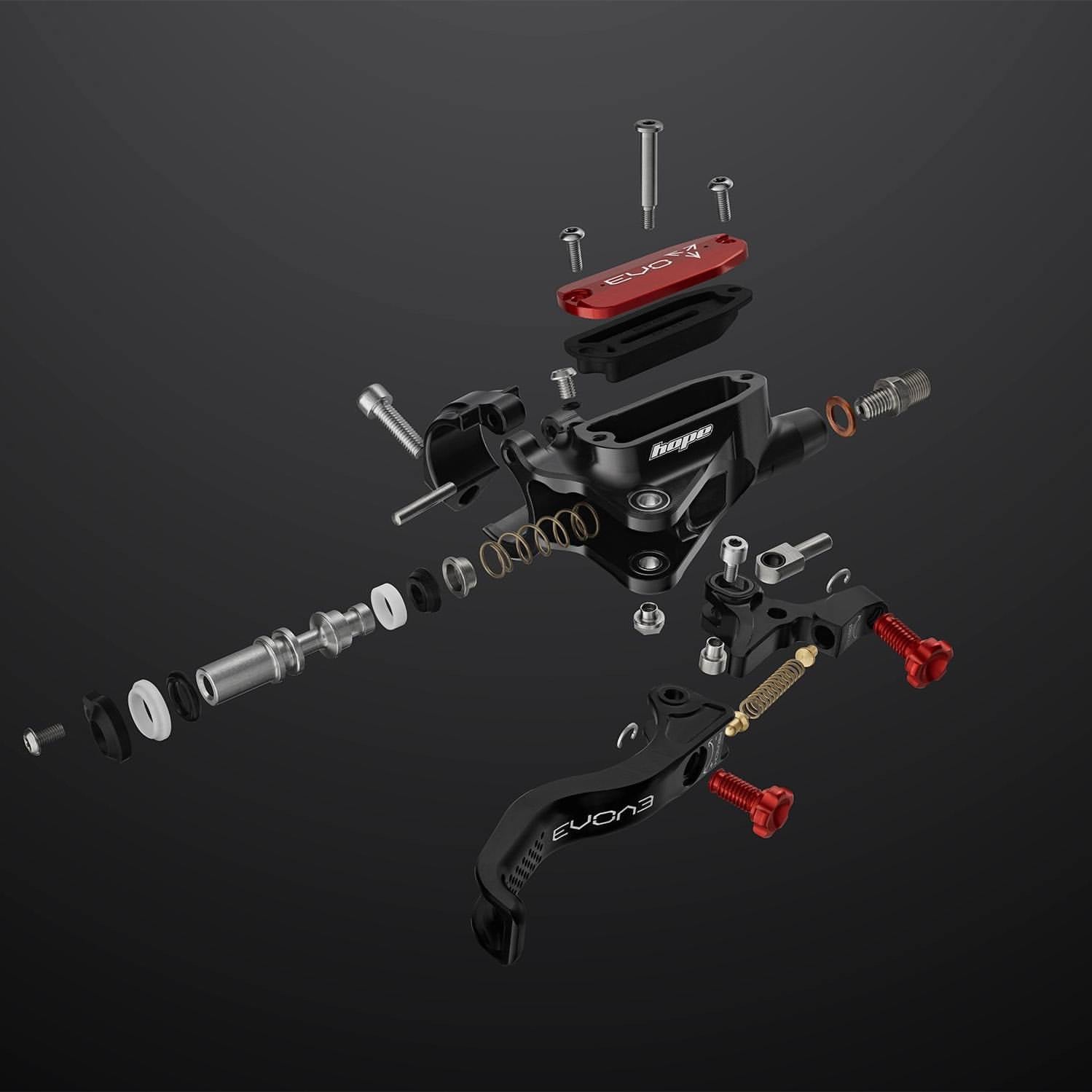Carbon vs. Aluminum: The Ultimate Showdown in Mountain Biking
You can click on the above headings to take you to the section you want to read
When it comes to the world of mountain bikes, every choice you make can spell the difference between conquering the terrain with finesse or wrestling with it.
At the heart of this decision lies a pivotal choice: the frame material of your mountain bike.
We have ridden both frame materials extensively, so we can help you understand the pros and cons of each.
Should you go with the feather-light prowess of carbon fiber, or is the rugged reliability of aluminum your preferred path?
It's a decision that sparks passionate debates among riders, each championing their favoured material.
In this exploration, we embark on a journey to dissect the attributes of carbon and aluminum mountain bike frames, delving deep into the realms of weight, comfort, efficiency, durability, cost, aesthetics, and maintenance.
| Table header 0 | Alluminium | Carbon |
|---|---|---|
| Weight | ✔️ | |
| Comfort | ✔️ | |
| Durability | ✔️ | |
| Affordability | ✔️ | |
| Responsiveness | ✔️ |
Everyone loves an infographic right? This one shows which material is best in what areas (generally speaking)
Bike Weight Comparison: Carbon vs. Aluminum

George weighing our large Norco sight carbon frame, with Fox X2 shock
When it comes to choosing a mountain bike, one of the crucial factors to consider is the weight of the frame material. In this section, we'll dive into the weight comparison between carbon and aluminum frames.
Carbon Fiber: The Lightweight Contender
Carbon fiber has gained a reputation for being exceptionally lightweight. It's a material known for its high strength-to-weight ratio, making it a favorite among riders looking to shed every possible gram from their bike while keeping it strong. Carbon frames are meticulously engineered to minimize weight while maintaining structural integrity.
This doesnt mean all Carbon fibre is equal. Most of the large bike manufacturers spend a long time finding the right factories to produce their cabon frames/parts. Carbon done incorrectly can be weak and crack easily. So be wary of cheap unbranded carbon frames. They are cheap for a reason!
A low quality modulus carbon would be cheaper but also weigh more and be weaker, some have been known to weigh more than a high end aluminium bike.
Aluminum: Sturdy, But Heavier
Aluminum frames, on the other hand, are generally heavier when compared to their carbon counterparts. While aluminum can vary in weight, they tend to be denser than carbon fiber, which can make a noticeable difference on the trail. Although aluminium frames have got better as the manufacturing processes develop.
To show weight difference by comparison this is what Flow Mountain Bike have to say about the Norco Sight "Norco offers both carbon and alloy frame options, and each one is seriously overbuilt. Claimed weight for an alloy Sight frame is a substantial 4.6kg with a rear shock, while the carbon version drops down to 3.8kg with shock." Although our scales show 3.7kg on a size large
But is weight the only factor to consider when choosing a mountain bike frame material? Let's explore further.
Are Aluminum Bikes Harsh? Is Carbon More Comfortable?
Mountain biking is about going fast right? Many riders wonder if there's a noticeable difference in ride feel/Comfort between carbon and aluminum frames.
Carbon's Vibration-Damping Magic
Carbon fiber has a unique ability to absorb vibrations and dampen the harshness of the trail. This translates to a smoother and more comfortable ride. The natural flexibility of carbon helps it absorb shocks and impacts, reducing fatigue during those epic bike park days where braking bumps are common place.
Aluminum's Sturdy Stiffness
Aluminum frames, while stiffer than carbon, can sometimes be perceived as harsher. The stiffness of aluminum transmits more of the trail's vibrations and bumps to the rider, potentially leading to a less comfortable experience, especially on rough terrain.
But comfort isn't the only factor to consider when choosing a frame material. Let's move on to explore other aspects of performance.
Are Carbon Bikes More Efficient, Stiff, or Responsive Than Aluminum?
Efficiency, stiffness, and responsiveness are key performance attributes that can significantly impact your riding. Racing at local events? or just thrashing round the woods with your mates, either way your frame material will effect your ride.
Let's break down how carbon and aluminum frames compare in these aspects.
Carbon's Efficiency and Responsiveness
Carbon frames are often praised for their efficiency and responsiveness. The material's natural flex can translate into better power transfer, making each pedal stroke more efficient. This responsiveness allows for quicker acceleration and more precise handling, which can be a game-changer in technical terrain.
The torsional stiffness of a carbon frame really sets it apart from its aluminium brother. This stops flex at the linkage and bottom bracket area. This massively helps when pushing into corners, the power transfer will be far greater than on an aluminium frame.
Aluminum's Stiffness and Durability
Aluminum frames are known for their stiffness, which can provide excellent power transfer as well. While they may not offer the same level of flex as carbon, the stiffness can be an advantage in certain situations, like sprinting and aggressive riding.
But as we spoke about above, aluminiums torsional stiffness is lacking in comparison to carbon.
If you stand on the pedal of an aluminium frame and push sideways you will see the flex in the frame. This leads to less power being transfered during hard cornering.
Are Aluminum Bikes More Durable Than Carbon Bikes?
Durability is a critical factor, especially if you're investing in a mountain bike for the long haul. Let's examine the durability of aluminum and carbon frames.
Carbon's Strength and Vulnerabilities
Carbon fiber is incredibly strong when engineered correctly. However, it's essential to note that it can be vulnerable to impact damage. A hard hit on a carbon frame can lead to hidden internal fractures, potentially compromising its structural integrity.
Maintenance and regular inspections are crucial to ensuring the longevity of a carbon frame.
Carbon fiber does have a specific tensile strength of approximately 3.8 times that of aluminum. So its by far stronger than its aluminium counterpart.
Also bear in mind that all frames can crack be that aluminium, steel or carbon. Carbon fibre is more flexible than aluminium meaning some hits can be absorbed, Whereas the rigidity of aluminium can cause bends and stress fractures to the welds.
Aluminum's Robustness
Aluminum frames are generally more resistant to impact damage.
They can withstand crashes and hits better than carbon, making them a preferred choice for riders who anticipate rough riding conditions or those who tend to be hard on their bikes. Thats why you dont often see dirt jump bikes made of carbon.
The weak points of an aluminium frame is generally at the welds. So Keep your eye out for any cracks around these areas after any impact.
Also bear in mind steel and aluminum frames can only last so long before the metal fatigues and can no longer be used safely, but carbon remains stable indefinitely. The lifespan of an aluminium frame is between 5-10 years, whereas Carbon is 10+ years.
Aluminum Bikes Are (Usually) Less Expensive Than Carbon Bikes
Budget is a significant factor for many cyclists when choosing a mountain bike. Aluminum frames often offer a more wallet-friendly option compared to carbon. Let's take a closer look at the cost considerations.
Carbon's Premium Price Tag
Carbon fiber frames are expensive to manufacture due to the intricate processes involved in creating them.
The high cost of materials and production techniques drives up the price of carbon bikes significantly. If you're on a tight budget, a carbon frame may not be the most economical choice.
Also Carbon frames are sometimes given better spec. For example the Norco Sight Carbon comes with a Fox X2 Shock, whereas its aluminium brother comes with a Rockshox superdeluxe.
Aluminum's Affordability
Aluminum frames are generally more budget-friendly.
They provide an excellent entry point for riders who want a capable mountain bike without breaking the bank.
While they may not offer all the features of a high-end carbon frame, aluminum bikes can still deliver an enjoyable riding experience. Aluminium bikes usually start at a lower price point so you will find most entry level bikes are aluminium.
Carbon vs. Aluminum: Which Looks Better?
Aesthetics play a role in the decision-making process for many. The visual appeal of your mountain bike can be a factor in your choice between carbon and aluminum.
Carbon's Sleek and High-Tech Appearance
Carbon frames often have a sleek, high-tech appearance that many riders find visually appealing. The smooth, uniform finish and the ability to mold intricate shapes give carbon bikes a premium look.
Joints are molded together rather than welded leaving a smooth finish.
Aluminum's Dependable and Classic Look
Aluminum frames have a classic and dependable look. While they may not have the same cutting-edge appearance as carbon, they exude a sense of reliability and durability.
Welds can sometimes be bulky and ruin the look of a frame. but some companies have the welds down to a tee. Like the new Norco Fluid aluminium below.


The welds on our aluminium Norco fluids are barely noticable
Pros and Cons
Carbon Fiber Mountain Bike Frames
Pros:
1. Lightweight
2. Vibration Damping
3. Efficiency and Responsiveness
4. Customization
5. Aesthetics
6. Evolution
Cons:
1. Cost
2. Durability
3. Maintenance
4. Environmental Impact
Aluminum Mountain Bike Frames
Pros:
1. Affordability
1. Durability
2. Maintenance
3. Availability
4. Classic Look
5. Environmental Impact: Aluminum has a lower environmental impact in terms of production compared to carbon fiber.
Cons:
1. Weight
2. Comfort
4. Customization
Carbon vs. Aluminum: What Conclusions Can We Draw?
Now that we've explored various aspects of carbon and aluminum frames, it's time to draw some conclusions.
Ultimately, both carbon and aluminum frames have their strengths and weaknesses, and there's no one-size-fits-all answer.
Your choice should align with your individual preferences, riding style, and budget. Take the time to test ride both options, if possible, and seek advice from experienced riders or bike shop professionals to make an informed decision. You can contact us and we are more than happy to chat with you about it.
Remember that your mountain bike is more than just its frame material. Components like suspension, drivetrain, wheels, and tires also play a massive part in your riding experience. So, whether you choose carbon or aluminum, make sure your entire bike setup suits your needs.
MEET THE AUTHOR
GAVIN RICHARDSON
Some say Gavin invented the wheel. They are lying of course, but he does build a mean set.
Chief of Cykel House, aging rider and father of 3. Gavin has been riding the majority of his life in multiple different forms. He created Cykel House out of passion and enthusiasm for the sport which cannot be matched.
Always on the hunt for the best products and latest trends his finger is right on the pulse.
Interesting fact - Gavin won a handwriting competition at age 7. What a legend.
Likes - A well built berm, beer and raw sprouts
Dislikes - Stainburn woods, headset cable routing and lycra





Comments